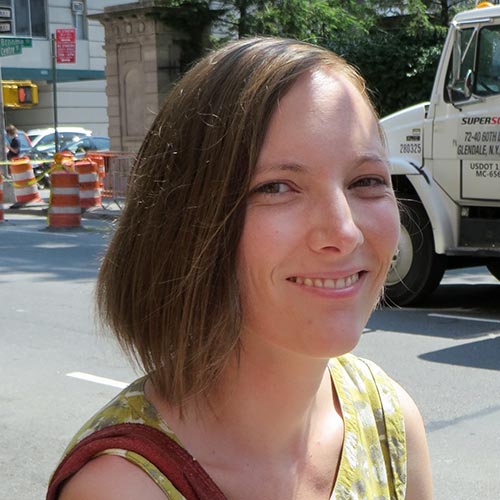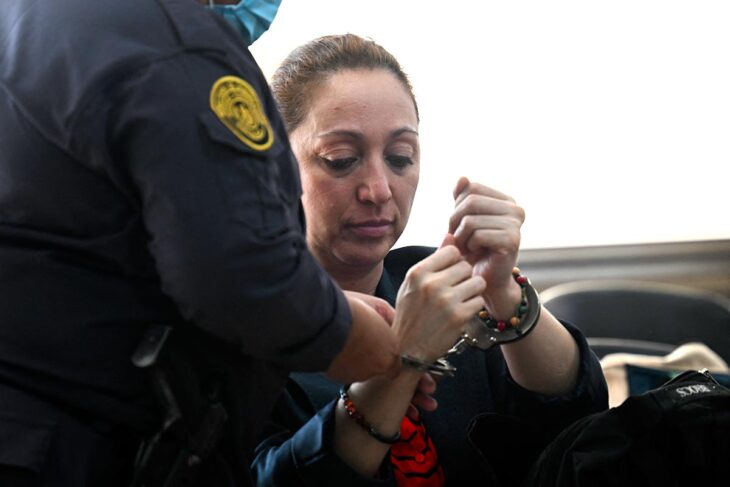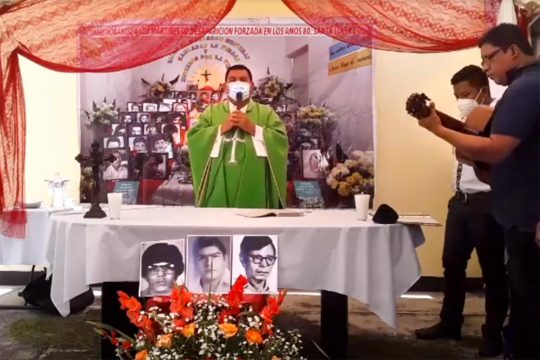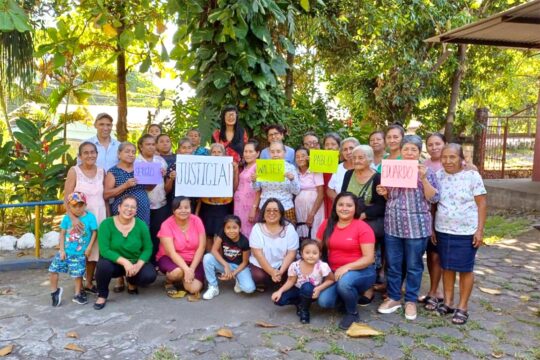Last March, Guatemalan human rights prosecutor Orlando López was arrested on charges of abuse of power and illegal acts. López is a well-known prosecutor, as he brought former dictator Efraín Ríos Montt to trial for genocide in March 2013. Montt was convicted, but the verdict was annulled less than two months later, allegedly for procedural reasons but in reality because Guatemala’s economic and military elites opposed the prosecution of high-level military. López was arrested based on accusations of Ricardo Méndez Ruiz, leader of the extreme right wing Anti-Terrorism Foundation created to defend the military. In recent years this Foundation has dedicated itself to denouncing and persecuting anti-corruption judges and prosecutors. Méndez Ruiz applauded López’s arrest on Twitter, stating that he was responsible for the ‘illegal capture of our veterans’.
Unfortunately, López’s arrest is not an incident, but only the latest development in a systematic process of undermining of the rule of law and judicial independence in Guatemala. The Attorney General’s Office, led by Consuelo Porras, has worked systematically to prosecute anti-corruption judges and prosecutors. It has done so hand in hand with Méndez Ruiz’s Anti-Terrorism Foundation.
Chronicle of a backlash foretold
In Guatemala, a country which experienced a bloody internal armed conflict from 1960 until 1996, impunity was long the norm. Both cases of serious human rights violations committed during the conflict and cases of later crime and corruption went largely unpunished. This changed dramatically in 2007, with the creation of the UN-sponsored International Commission to Combat Impunity in Guatemala (CICIG). The internationally acclaimed CICIG, composed of international and Guatemalan jurists, managed to investigate and prosecute illegal security groups and clandestine organisations in Guatemala, including networks of corrupt politicians up to the highest level. In fact, the CICIG became too successful, threatening those elites who had long deemed themselves untouchable. Its investigation of then-President Jimmy Morales led to his decision to end the CICIG’s mandate in 2019.
This was the start of a process in which the work of independent judges and prosecutors became increasingly difficult. The economic elites and corrupt politicians managed to take control of the justice institutions, and started a witch hunt against those who had investigated the cases of the CICIG. They targeted both those directly investigating and sentencing cases and those defending CICIG’s work as a Constitutional Court judge. A common pattern is evident in these cases, where justice operators are falsely accused with fabricated evidence, or are outright fired based on invented complaints of lack of subordination to superiors in the Attorney General’s Office, abuse of power and the like. Méndez Ruiz and his Foundation have been responsible for some of the accusations and requests to strip judges and prosecutors of their immunity – requests acted upon enthusiastically by the Attorney General’s Office. Its head, Consuelo Porras, was re-elected for another term last year, in spite of being included in the United States’ State Department’s ‘Engels List’ of public officials considered to be responsible for undermining democracy and obstructing investigations into acts of corruption. Her re-election showed how the President and Attorney General work closely together, supported by extreme right-wing actors like Méndez Ruiz.
Close to 30 judges and prosecutors have seen themselves forced to go into exile to avoid being arrested, while ten prosecutors face lawsuits in Guatemala, like López. Among them is also anti-corruption prosecutor Virginia Laparra, who was arrested in February 2022 on unfounded charges of ‘ongoing abuse of authority’. She was sentenced to four years in prison for these ‘crimes’ in December 2022, while a parallel process against her is still ongoing. Laparra, considered a prisoner of conscience by Amnesty International, is detained in conditions that are not dignified, and has no access to timely health care. On 20 April, former head of the Tax Agency, Juan Francisco Solórzano Foppa, was also arrested on charges of obstruction of justice. While heading the Tax Agency, Foppa tried to combat tax evasion, another action harming powerful actors in Guatemala.
Human rights as new battlefield
Most recently, this battle in which the law is used as an instrument to undermine judicial independence and the rule of law, has broadened from those fighting corruption to those combating impunity for serious human rights violations during the internal armed conflict. Prosecutor López is a key example of this development, but he is not the only one. In November, judge Miguel Ángel Gálvez, who has been key to holding some of the perpetrators of those crimes accountable, left the country. From exile, he resigned from his position as judge in one of Guatemala’s high-risk courts which deal with high-level cases.
Gálvez too played a role in bringing former dictator Ríos Montt to justice, and most recently he led the so-called Death Squad Dossier case. This case is a major example of the systematic terror during Guatemala’s internal armed conflict. It is based around a military dossier which contains the photographs of 195 Guatemalans who suffered serious human rights violations, including forced disappearance, extrajudicial execution, arbitrary detention, torture and sexual abuse. In 2021, fourteen retired military and police officials and one civilian were arrested for this. In the following year judge Gálvez sent nine of them to trial, including senior military officials connected to criminal networks. Touching upon the interests of high-level military and veterans unleashed an intense harassment and intimidation campaign led by Méndez Ruiz, eventually forcing Gálvez into exile.
The judges who replaced Gálvez have already released three of the accused from pretrial custody. Similar requests have been made by the other accused and it is feared that the case will be further dismantled. Several injunctions in other high-profile cases are awaiting decisions by the Constitutional Court, a court with no smooth track record in defending human rights. Two of its current judges voted in 2013 to annul the genocide verdict against Ríos Montt, and in 2019 one of these magistrates was in fact vice-presidential candidate of Ríos Montt’s daughter Zury Ríos.
A crucial election time
In June of this year, Zury Ríos will again run for president. Ríos stands a good chance of becoming the next president, being backed by the economic elites, military and the Anti-Terrorism Foundation. Several progressive candidates have instead been barred from running. Her election is a worrying prospect for the situation of human rights and rule of law in Guatemala. Ríos has already pushed for an amnesty initiative law, euphemistically called ‘Law for the Consolidation of Peace and Reconciliation’ which would end all lawsuits and annul all sentences for crimes committed between 1960 and 1996. This would mean a return to full-scale impunity for the country, and a situation of intense insecurity for those involved in earlier lawsuits, both as judges, prosecutors and witnesses. Whereas judges and prosecutors may have the chance to go into exile, with all the emotional and economic toll this takes on personal lives, most of the often poor indigenous witnesses have no such options. Without effective institutions protecting the rule of law, indigenous grassroots human rights defenders are left defenceless. Between 2012 and 2022, 80 environmental activists, many of them Indigenous, were killed in the country.
If Ríos indeed wins the elections, an even bleaker future awaits Guatemala. It is shocking that those who for a decade were at the forefront of a successful, internationally supported process of combating impunity and corruption, are now facing the consequences through exile, arrest and detention. At this crucial moment, the international community must do all that is in its power to prevent the situation from worsening. It must support those that were so crucial for the temporary break in Guatemala’s landscape of impunity and the hundreds of witnesses in these cases, through legal and political support. It should also denounce in much clearer words what is happening in Guatemala and make sure that the ruthless dismantling of the rule of law does not stay without consequences. Finally, close monitoring of the upcoming elections should make sure that they are transparent and fair and that some hope remains for Guatemala’s future.

Sanne Weber is a senior programme officer for Impunity Watch, where she undertakes research and lobby on issues related to the rule of law, reparations for victims, and gender. She is also an academic researcher connected to the University of Birmingham. Her academic research explores how conflict affects gender relations, and how transitional justice mechanisms can transform gendered and other structural inequalities. Her work focuses particularly on Latin America (Colombia and Guatemala).







